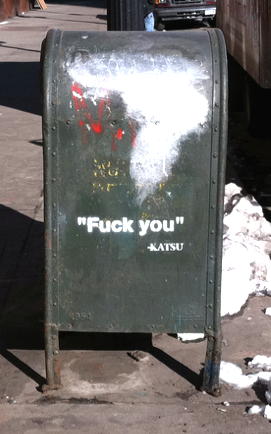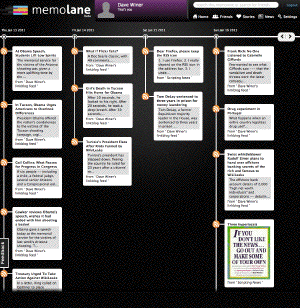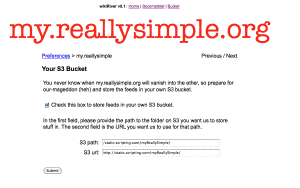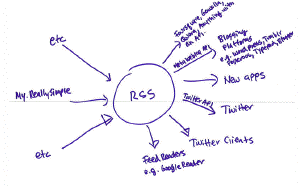
 What is deck.ly?
What is deck.ly? 
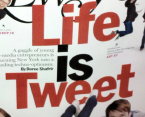 Tweetdeck has announced something called deck.ly, which promises to let you tweet in more than 140 characters, something I welcome.
Tweetdeck has announced something called deck.ly, which promises to let you tweet in more than 140 characters, something I welcome.
Beyond that the website is pure confusion.
1. Do I need to use Chrome to access this service, or can I get there from Firefox (the browser that I use all day every day)?
2. Is this a proprietary thing, i.e. what if one of their competitors would like to offer the same service. Do they have to create something completely incompatible, or can they interoperate in some way. In other words have they created yet-another silo (boo). Is this just an attempt to break out of the grip of Twitter, Inc or is it something bigger with a future beyond one vendor?
3. What if, god forbid, Twitter wanted to support this? What would Tweetdeck say to that?
I guess that's enough to begin with. Once we know the answers others may come to the surface.
One thing that it definitely is -- an awful name. Sickly pops to mind. Dickly. Deadly. For a short URL (presumably why they chose this name), "deck" seems pretty long. And the fact that it's the end of their product name pretty much nails the answer to #2. Even if they offer an API, it's hard to imagine their competitors signing up for a service that's named after another vendor's product.
PS: A personal note -- white text on a black background is really hard on my poor eyes. Have some pity! ![]()
 Back in NYC
Back in NYC 
In Park City, the only cable news was: 1. CNN Headline News (stories about missing American children). 2. Fox News (a confusing mishmash of news video and narcissistic commentary). Internet access fairly pathetic, so there really was no option for other flows of news.
Now I'm in NYC with FIOS-level Internet, and am finally able to see the images so many others (on Twitter) have been seeing.
Here's something to think about. We heard a lot of people speak of the "historic" shutting-down of the Internet in Egypt, but realize that we're in a permanent news blackout in the US, the supposed "land of the free and home of the brave." We are not brave, we don't trust ourselves with the same news the rest of the world gets, and as long as we're having our flow of news curtailed (by whom?), we sure ain't anything like free.
Meanwhile the personal trashing of Julian Assange in American media continues. It's really embarassing. What is it they are so afraid of?
 Heading west
Heading west 
I'm zooooming my way to Salt Lake to see new movies the Sundance festival.
NakedJen says there's going to be a blogger's reception this afternoon in Park City. I'll try to be there for that.
If you're in Sundance I'll be the geek in the baseball cap grinning from ear to ear. ![]()
 EC2 for European Poets?
EC2 for European Poets? 
 I've gotten a request to produce a version of EC2 for Poets for people in Europe. Of course I will do it, but it never occurred to me that an AMI that runs in the US won't run in Europe.
I've gotten a request to produce a version of EC2 for Poets for people in Europe. Of course I will do it, but it never occurred to me that an AMI that runs in the US won't run in Europe.
Skimming the docs that are available, it seems this is a security thing. If your servers in the US go down, they won't necessarily take down your servers in Europe? Not sure.
Anyway, if anyone has any tips on how to create a European fork of a Windows-based AMI, please post a pointer as a comment. Thanks!
 BitTorrent and RSS sittin in a tree
BitTorrent and RSS sittin in a tree 
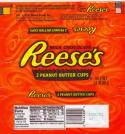 Two great flavors taste better together!
Two great flavors taste better together!
I am very happy to see EZTV is taking the lead in smoothing out the way BitTorrent uses RSS.
TorrentFreak reported on this development yesterday.
I've since looked at the feeds (an example), and they look pretty good. I know there are some people asking stylistic questions, but that's all they are. The way they're doing looks perfectly workable.
This is an excellent development!
Bravo!!
 New Yorkers make good villains
New Yorkers make good villains 
One of the things I love about the NY Times are the little NYC stories they publish, sometimes on the editorial page, sometimes elsewhere.
 Yesterday they interviewed New York-based actor John Hawkes in Park City at the Sundance Film Festival. How could such a nice young man play such an excellent villain, they wanted to know. "I think we all have it in us," he said. "You live in New York? You want to slug people every day."
Yesterday they interviewed New York-based actor John Hawkes in Park City at the Sundance Film Festival. How could such a nice young man play such an excellent villain, they wanted to know. "I think we all have it in us," he said. "You live in New York? You want to slug people every day."
It's true.
Yesterday I was buying coffee at a Dunkin Donuts on Third Ave. Taking out my wallet, another patron rushes past me to the counter. On his cell phone. Sticks out his cup and mouthes the word "Milk" to the counter guy. Keeps on with the phone conversation. The clerk pauses our transaction (I guess cause I'm not on a phone?) and adds milk to the guy's coffee and then comes back to me
This is why, when casting a movie, if you're looking for a good villain, seriously consider hiring a New Yorker. ![]()
 Leaks software will have broad applications
Leaks software will have broad applications 
 I just finished a book that someone sent me by email in mobi format. Works quite well with Amazon's Kindle software on my iPad. Written by a famous author, he withdrew it from publication after the events it depicted came close to happening in the real world. It's not a happy story. But it's quite well-written, and for those of us who aren't going to go out and commit the crimes, reading the book is a very harmless act. And if you, like me, have read everything by this author, you want to read this too. It's an early book, and as I said, a good one.
I just finished a book that someone sent me by email in mobi format. Works quite well with Amazon's Kindle software on my iPad. Written by a famous author, he withdrew it from publication after the events it depicted came close to happening in the real world. It's not a happy story. But it's quite well-written, and for those of us who aren't going to go out and commit the crimes, reading the book is a very harmless act. And if you, like me, have read everything by this author, you want to read this too. It's an early book, and as I said, a good one.
Okay, what happens now is nothing. I can't upload it anywhere for you to download. Not necessarily because I do or don't respect the author's wishes. For all you know he or she might be dead. But, if there were a leaks site, like the one run by WikiLeaks, or the ones being started by so many others, that specialized in apolitical leaks, I might have an option. I couldn't tell you about it here on Scripting News, but at least I could help other people who love this author's work find the book.
Sorry to be so cryptic, but I want to get this idea out there without stepping on any specific toes.
PS: I'm clearly not the first to think of this. ![]()
 A new meaning of Too Big To Fail
A new meaning of Too Big To Fail 
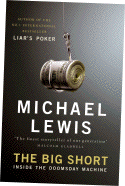 Just finished The Big Short by Michael Lewis, and it ends with a chilling thought about how fucked we are. There's no other way to put it.
Just finished The Big Short by Michael Lewis, and it ends with a chilling thought about how fucked we are. There's no other way to put it.
Before I read this book there was something I didn't understand about Credit Default Swaps, or CDSs, which are insurance policies, hedges against an investment failing. They are a way to short things that aren't stocks. In fact you can by a CDS for anything. You can buy a CDS against the Yankees losing the World Series.
But they are a weird kind of insurance. You don't have to own the Yankees to insure them. And both you and I could insure against the Yankees losing the World Series. Hundreds, thousands, even millions of people could do it. There's no limit to the exposure. So if the Yankees were to fail, i.e. fail to win the World Series, theoretically they could take the US economy with it, because of the way they were writing these policies in the days before the real estate bust.
Another example, fire insurance. You could insure someone else's house. Even if it was already on fire. And it would be priced as if fire was only a remote possibility.
And since credit default swaps are unregulated (thank you Reagan, Clinton, both Bushes and the U.S. Congress) no one knows how many CDSs have been purchased against any event. So you end up with the prospect of a small company being too big to fail.
BTW, this is why the US taxpayers had to back the investment banking industry with over $1 trillion of our money. The same people who are buying our government all over again.
Question: Did we outlaw Credit Default Swaps or at least regulate them? (Heh.)
 Dear Keith Olbermann
Dear Keith Olbermann 
A special comment.
I say this to every bigtime oldstream media celeb that I care about when they get booted out on their butts.
They did you a favor.
But they sure didn't do the rest of us a favor.
What interest do your followers have in you being booted off the air? How exactly does that help them?
To be honest, I stopped watching you on MSNBC after the Obama inauguration. I figured you were going to stay with Washington politics, as you did. I figured that was as good as it was going to get, and all the lobbying and cajoling wouldn't do a bit of good from that point on. I don't have any regrets. Obama isn't much better than Bush unfortunately. That was obvious a few days after the inauguration.
I felt then as I feel now, that the future of communication is not about the bottleneck that MSNBC and their competitors control. I don't think you really need them. Unless of course you need to make $5 million a year, in which case you probably do need them. But if what you're interested in is power to influence public opinion, and becoming more relevant over time, not more niched over time -- if being influential is what you're about, they really did you a favor.
 So here's what I recommend. Borrow a page from Conan O'Brien's playbook, and use the social network to communicate with your fans.
So here's what I recommend. Borrow a page from Conan O'Brien's playbook, and use the social network to communicate with your fans.
Get a video camera and put it in your living room or den at home. Hit Record. Sit down in front of the camera and rant for 15 minutes. You can do that, I'm sure. Then without any production at all, upload it to YouTube and send the link around on Twitter. The first time you do it, it will be the most watched video of the day. Far more people will see it than used to see you on MSNBC, or O'Reilly or Beck or any of them. Depending on how fresh and interesting it is, and how real it is, and how compelling you really are (I know that's a lot of "depends") there won't be much of a dropoff on Day 2 and 3 and so on. Now you've got your own network. And no one can shut you down. And you'll have a lot more people watching you.
You might even get a chance to open people up to some new ideas and god forbid change a few minds.
And when something dangerous and outrageous or just obnoxious happens, we'll know where to find you. That's kind of important. ![]()
Good night.
And good luck.
![]()
 Do you remember how OPML used to work?
Do you remember how OPML used to work? 
This post is for Scripting News veterans, as well as the River-of-News group that formed around wikiriver.org last month.
We used to do show notes and directories in the podcast world with OPML, because both were booting up at the same time. Every time we did a podcast, we'd do an OPML version of show notes.
We were also trying to keep track of all the programs, so we'd have a directory of directories, each in OPML. I had software that browsed these networks of OPML directories.
You could do inclusions -- where I link to your outline, but when a user expands it, it appears to open in mine (it actually does).
I eventually stopped trying to make this work, but all my tools still do it. In fact in OPML 2.0, the protocol for inclusion was streamlined, to follow the practice that had developed.
Now here's something I just realized that's fairly interesting. I bet in today's browsers it would be fairly easy to implement this kind of OPML directory. Javascript programmers would rather have it delivered in JSON. Of course it doesn't matter what the format is, what's needed is a community of authors building a great wandering world directory that is open to anyone, where we hold hands in cyberspace with new power.
This is a big honking idea. If this were to actually happen, it would be an incredible complement to Wikipedia. It probably would help search companies build new engines that give us not just answers, but context. And choice of context. Unlike Wikipedia there could be many ways to arrive at a spot. That would be subject to editorial judgement, and would not require consensus. I think that's a huge deal, and would increase participation. But I'd love to do it mostly cause it would be huge fun. ![]()
Right now, if you're a Javascript programmer, here are a bunch of links for what we were doing in 2003 and 2004. Have a read, and think about it, and let's discuss if you're interested.
June 2000: The first blog post here about the World Outline.
June 2002: The Googlish Way to do Directories.
Not sure of the date: Editing the SoapWare directory with Radio's outliner.
A Google search for "world outline" on scripting.com in chronologic order starting in 2000.
 Educating the journo-programmer
Educating the journo-programmer 
 There's an idea, emanating from New York, that if we somehow combine the talents of programmers and journalists, we'll figure out how to make news work in the age of the Internet. I haven't been sure what to call this, but I agree that there's a lot of power in the combination.
There's an idea, emanating from New York, that if we somehow combine the talents of programmers and journalists, we'll figure out how to make news work in the age of the Internet. I haven't been sure what to call this, but I agree that there's a lot of power in the combination.
Justin Ellis, writing on the Nieman Lab site today, came up with a simple name that works, "the journo-programmer." Until a better term comes along, let's go with that.
One of the reasons it's important, here, is that two of the journalist-teaching universities, NYU and Columbia, have launched programs to create them. At NYU, Jay Rosen, my colleague and partner in the Rebooting The News podcast, is leading the effort with Studio 20. Columbia hired Emily Bell to lead their effort, a graduate program called Tow Center for Digital Journalism.
I visited with Bell last week at her office at Columbia. It was a snowy cold day, but what a beautiful place!
We talked about our histories (she had a career at the Guardian before coming to NY), and WikiLeaks of course (at the center of what we both do) and then to this idea -- the journo-programmer.
So...
What is a journo-programmer, and how does higher education create one? Or is it a god-given gift, and is our job merely to develop the talent where it already exists? Can you teach a programmer to be a writer, or a writer to be a programmer? It seems the first step is to ask people who have already made the journey. From both directions.
A quick story. I made a decision in late 1994 to dive into the web. The door was opened for me by the SF newspaper strike. I've written about this here many times. But here's something to focus on for this subject. The writers, who were professional news people of the mid-90s, largely before the big change swept through their industry, were very well-versed on the abilities of the web. Not all of them. But my best teachers were the ones who understood and used linking. And made it very clear that we, the unpaid production staff, were not to lose a single link. Made an impression. The same kind of impression that reading the source of Unix left with me when I was a grad student in the late 70s.
The importance of linking is comparable with procedures in programming languages. Imagine if every piece of code you wrote had to go all the way back to the beginning and define what it means to add two numbers. Same with writing. I don't have to write the Nieman article because it has already been written and I can link to it.
In that sense the web is a prior-art machine. A way of sharing know-how. There's another key, different concept. In the past, as a writer, it was easier to just reinvent than to reference earlier works. This came up in a Twitter exchange, where calixte said that WikiLeaks had liquified the press, turning it into a river. I love that. I think it's very true. Assange basically said that. Please focus on the cables, he urges, but don't miss that along the way I got the journos to work with each other. There's the liquification. It's one of the things you see very clearly through the lens of wikiriver.org. There's a lot of duplication in the press, for sure, but there's also a lot of linking and referencing.
The next question is how do we teach the journo-programmer. As you might imagine, I have a few ideas about that. ![]()
Here's what I say. Don't worry about how to do it, at first -- just start doing it. When we started blogging at Harvard, our first few approaches failed. They wouldn't have worked any better if we spent a year planning them. Better to try an approach, learn, get it out of the way, and come up with new approaches, until you find a way that works.
In most university departments there is permanent paid staff that manage the websites for the students and faculty. It seems to me, if your goal is to boot a new class of programmers and journalists, this activity should be brought into the curriculum, and every student should participate in managing and developing his or her own publishing infrastructure.
We're not ready yet to teach how to do this, but a few semesters after the students start, we will have a very good idea of how to accelerate the process, produce more reliable results. And eventually we will be able to teach it alongside the other skills that make a programmer a programmer and a journalist a journalist.
We will also have a much better idea where existing tools are insufficient, which will lead us to the next phase where the students not only manage the infrastructure, they develop key parts of it. At NYU we learned we have students that are this ambitious with the Diaspora project.
Developing is not something to rush into expecting success from your first efforts. From the outside shipping useful software looks easy. It's an illusion created by the ease-of-use of the resulting product. If the product is easy, the process of creating it must be too. When I say it that way you can see it's not true. It would be like telling the parent of a wonderful 20-something that raising a child must be easy, because look at how pleasing the end result it. Never mind all the problems along the way, that becomes hidden. Same with software.
Okay that's how a department at a university might approach it. But what if we let this problem liquify the individual campuses, the same way WikiLeaks is liquifying journalism. What if trying to go it alone is as un-Internet as trying to lock your users in, or not allowing off-site pointers. Well, we got a good start at this sharing process, in the mid-2000's, when the goal was to bring blogging and podcasting to academia. We did a series of academic conferences that covered blogging from a variety of angles. We looked at how to help people start blogging (that must come first), how to bring new technology to blogging, and the beginnings of blogging as a cultural, political and journalistic process. There were lots of other topics, but these were the main threads.
Every journalism department should learn the art of aggregating. One of the small things I've been able to do to enrich the program at NYU is provide an East Village aggregator. The students should be learning how to create these sites. When I leave, what will happen if they want another aggregator. This technology is now fully mature and any student with reasonable technical ability (i.e. almost all of them) can be taught to manage such a site.
I truly hope the hackathon approach falls away. Not much is ever accomplished in intense social programming. Writing code, like writing long essays like this one, is not something you can do in an environment with lots of interruptions. One interruption at the wrong time can set you back by hours as the map falls out of your head. Programming and writing are both intellectual acts. So why would you expect great results from a crowded, smelly room that people have been living in for 24 hours. What you end up with is a bunch of tired, smelly and basically dishonest people (the most impressive projects are done in the weeks and months before the hackathon and just use the event to promote the work).
Instead take a step back, and envision the big problems we need to take on. Let's break them up into manageable components, and start to solve them with our most talented students, in an interative open source fashion. Very quickly we'd bootstrap a system that works as well as the initial Internet did in the 70s. I was there at the tail end of the Unix bootup. It wasn't a hackathon, it was more like a marathon. We have to teach our young people to think and work for the long-term. And we start by understanding the process and what yields useful long-term results and what just makes good demo.
I would also insist that every student, without exception, run their own server. Bursting the mystique of the cloud is the easiest first step. That server will play the same role that a cadaver plays for a medical student. It's a place for them to make mistakes, to gain experience, to gain rational and realistic fears, but not unnecessary ones.
I've written a tutorial called EC2 For Poets introduce Amazon EC2. In about 1/2 hour the student sets up and launches their own server in Amazon's cloud. For many it's an eye-opening experience.
Running software on the server is no different from running software on the desktop. The priesthood would like you to believe otherwise, but it's not our job to reinforce the priesthood. Quite the opposite, our job is to explode it.
Part of the brilliance of univervities is their iterative nature. We need to do a lot of iteration in pursuit of the journo-programmer. Every semester is a new beginning. Every new student is a chance to try a new approach.
 Twitter's "What's Happening?" box
Twitter's "What's Happening?" box 
 One of the huge pieces of prior art for my minimal blogging tool is the What's Happening? box on Twitter. It's almost like magic, esp combined with a bookmarklet. You're on a web page that you want to link to from Twitter. Click the bookmarklet. The title and a shortened link appear in the What's Happening box. Edit. Submit. Back. You're in and out real quick.
One of the huge pieces of prior art for my minimal blogging tool is the What's Happening? box on Twitter. It's almost like magic, esp combined with a bookmarklet. You're on a web page that you want to link to from Twitter. Click the bookmarklet. The title and a shortened link appear in the What's Happening box. Edit. Submit. Back. You're in and out real quick.
It's why Twitter is, for me at least, what del.icio.us is for others. No problem sharing the link, but I'm primarily motivated to save the link as places I want to come back to later.
So as I've been honing my.reallysimple.org, I finally had to deal with this. How to reconcile two aspects of the app:
1. It's designed to output RSS.
2. I want the stuff to flow through Twitter.
Turns out this is a bit of a difficult question.
What it boils down to: If you had to map the Twitter "What's happening" box onto a feed, would it be the title or the description?
I think it's clearly the description. Because titles are (intuitively) one-line things. The Twitter box is multiple lines. That's the description.
I wrote up the problem in more detail on my changes page.
Comments, respectful of course, and not personal -- are welcome.
 NYC mailbox
NYC mailbox 
I chuckled when I saw this. Had to take a picture.
Maybe this is why I like NY. People hardly notice. Certainly no one has the time or attention to be upset by this. In Calif, such a mailbox would get people all agitated. "Why is he so difficult."
It's not an angry thing -- it's informative. I think that's what you have to know to get NY. Look, life isn't easy. Let the small stuff roll off you. And you feel good about that.
Not victimized. Victorious.
PS: As if to prove my point. ![]()
 Brockman's science
Brockman's science 
I've known John Brockman and Katinka Matson, NY book agents extraordinaire, for over 25 years. I first met them when I was the CEO of a software company making tools for visualization and organization of ideas. We called them idea processors. The category eventually was known as outliners. In the mid-80s, there was an idea that software might be like books, with publishers and agents. So the big NY book publishers came to Brockman to see if he could put something together. That's how we met.
 They're an odd couple, for sure. Brockman is a Jewish guy with a Boston accent, and a past rooted in 60s counter-culture, but these days he hangs with the richest and most famous of the tech and academic world. His annual dinner at TED (which I have never attended) is thought to be a ticket to party with the elite insiders of tech. Katinka is a statuesque beauty with a fierce intelligence. She is an artist. John often wonders how a guy like him attracted a woman like that. It's part of what makes them such a memorable couple.
They're an odd couple, for sure. Brockman is a Jewish guy with a Boston accent, and a past rooted in 60s counter-culture, but these days he hangs with the richest and most famous of the tech and academic world. His annual dinner at TED (which I have never attended) is thought to be a ticket to party with the elite insiders of tech. Katinka is a statuesque beauty with a fierce intelligence. She is an artist. John often wonders how a guy like him attracted a woman like that. It's part of what makes them such a memorable couple.
I love them because they are so weird and interesting, but also because they encourage me as a writer. I think they genuinely enjoy good writing, especially stuff that reaches into the heart. And while I'm not famous or popular enough to get a ticket to TED, I was profiled in Digerati, their original book, given the title of The Lover. I think that was an inside joke, because at the time I, like Brockman, was dating way above my level. Or maybe it was because in the early DaveNets I wrote about love and respect, a lot. Who knows. Steve Case was quoted saying I was the poet of cyberspace, but I don't think the top guys at Apple or Microsoft thought that about me. And I imagine John Perry Barlow might take exception. ![]()
Anyway -- at the end of every year Brockman circulates The Question to an elite list of scientists and tech leaders. I've been on the list for many years, but this is the first year that I wrote an essay. What inspired me? Jay sent me a copy of his essay, and I thought, that looks easy, and a few minutes later I had mine. It's about social connections in the big city, but it's really about intimacy. You see, there I go again writing about people instead of science! ![]()
I told Brockman, it's too late. I'm a populist. Can't help it. That means I am mainly interested in people. Pretty simple.
Anyway, I'm proud to be in great company this year. There are so many famous and wonderful essays by people I love and respect. I hope to have the time to read them all very soon.
PS: The title of this piece is a play on the name of my high school, which I visited on Monday. Fresh memory. ![]()
 EC2 for Poets, on the ground
EC2 for Poets, on the ground 
For inspiration, please read the 50,000 foot piece.
Here's what I did today in EC2-for-Poets land.
1. I wanted to get an idea of how many servers were running, so I pushed an update that has each server ping one of my servers once a minute. I keep a table there indexed by IP address with the number of times it pinged and when it last pinged.
2. I am now running a micro-instance, based on a discussion in the comments under the Howto. I'm going to leave it running a while and see how it performs. Micro-instances are much cheaper than "small" ones.
3. I started a mail list for users and developers. Please read the initial message before signing up.
 EC2 for Poets, viewed at 50,000 feet
EC2 for Poets, viewed at 50,000 feet 
 Well, we're over the initial hump.
Well, we're over the initial hump.
A bunch of people ran the new EC2 for Poets tutorial and got all the way to Hello World. So I'd say the new instructions work, there are still a few things to smoothe out, but we're up and running.
Now I can tell you where we're going on this little trip. ![]()
We're going to Independence Hall in Philadelphia, where our forefathers, here in the USA, decided to be independent from Great Britain. We appreciated the training wheels they provided when we were a very young country, but now it's time for us to be on our own.
In other words...
I'm pretty sure we know how to create a micro-blogging community with open formats and protocols and no central point of failure.
The goal is to create many places where blogging and journalism can occur. Where we pay for the servers ourselves, so the terms of use make sense for the high-integrity work we do. We have choice. If we don't like the service we get one place, it's easy to pick up our stuff and work somewhere else.
So we've got a start. There's a River2 aggregator running on each of the EC2-for-Poets machines. It's the same feed reading tool we had in Radio 8, a few years ago. There's a lot more stuff working in there, it's faster, and we've got a little community doing skins for it. It's a start.
 And it's in a different place now. Instead of running on your desktop, it's in the cloud. Where one installation can serve many users. It's like having your own Google Reader running in the cloud. Where you can customize it to work the way you work.
And it's in a different place now. Instead of running on your desktop, it's in the cloud. Where one installation can serve many users. It's like having your own Google Reader running in the cloud. Where you can customize it to work the way you work.
Next we'll have simple blogging and synchronization tools that run in this environment.
And all of it will be built around an open format called RSS. That's how all the components talk to each other.
So if you want to use someone else's software, god bless, please do.
This is a very deliberate attempt to create a coral reef. I will put all the pieces together. I hope to make a little money from this work at some point. But I don't expect or want to make all the money. I'm more interested in creating a wonderful environment for sharing our thoughts, images, music, sounds, ideas and code. Places we can work together.
It's the same idea we started blogging with in the mid-90s, but freshened up for the way we do it in the teens.
 Please see "Inside Job"
Please see "Inside Job" 
 Yesterday afternoon I went to see Inside Job at the Village East Cinema on 2nd Ave in NY. It's a haunting movie. It fills in a lot of missing pieces on the meltdown of 2008, vs what we were hearing on TV and NPR and reading in the news. Not that any of the journalists did anything wrong, they didn't. It's such a complicated story and the misdeeds are so enormous and on such a huge scale, that it takes some time and probably a few tellings for it to sink in.
Yesterday afternoon I went to see Inside Job at the Village East Cinema on 2nd Ave in NY. It's a haunting movie. It fills in a lot of missing pieces on the meltdown of 2008, vs what we were hearing on TV and NPR and reading in the news. Not that any of the journalists did anything wrong, they didn't. It's such a complicated story and the misdeeds are so enormous and on such a huge scale, that it takes some time and probably a few tellings for it to sink in.
At the same time I'm reading The Big Short by Michael Lewis, which is filling in the details about how the idea of CDO's and CDS's developed. What's amazing about it is that, according to Lewis, the people doing it were fully aware of how depraved and immoral it was. (It would be hard to see how they wouldn't be aware of it.) How they were deliberately creating bad products to sell to their customers, and then betting against them. The worse they were, the more money they made! And they were doing it on such a massive scale that the only way to clean it up would be with public money.
It's as if you are selling $100 notes for $1 and getting a 20 percent commission on each sale. The notes come due in two years, but you get your bonus at the end of this year. Who cares? You're selling off your own employer, knowing that when this process unravels, and it will unravel, they will die. That's not old-fashioned free market goodness, that's new-age cocaine-inspired depravity. (And yes they were doing coke.)
 BTW, one thing I didn't understand about credit default swaps, which is simply insurance on a bond becoming worthless (simple enough idea), is that I could take out insurance on a bond I don't hold. It's as if you could take out insurance on my house. Hundreds of people could. And you can bet as much as you want! I might have built my house on a hill where it rains in winter. And the guy selling you the insurance didn't even look to see where the house was. Unbelievable as it may be, that's the story.
BTW, one thing I didn't understand about credit default swaps, which is simply insurance on a bond becoming worthless (simple enough idea), is that I could take out insurance on a bond I don't hold. It's as if you could take out insurance on my house. Hundreds of people could. And you can bet as much as you want! I might have built my house on a hill where it rains in winter. And the guy selling you the insurance didn't even look to see where the house was. Unbelievable as it may be, that's the story.
We tend to believe the free unregulated market is the best, and maybe it was when we were trading goats and wheat, and selling our own goods, not our neighbor's. But computer networks and creative lawyers and people with no pride, honor or empathy have made it possible to pervert that so that even if there were laws to protect us from them, there would be no one to enforce them. That's made totally clear by Inside Job.
I think of my former colleagues in Silicon Valley who are understandably proud of their Davos invitations. You guys should watch the movie before you go, and know that's who you are hanging out with. It's playing at the Bridge Theater, 3010 Geary Blvd, San Francisco. I think they should have a showing of the movie at Davos, it's so important. Might really change the discussion.
And the academics, well I'm proud to say that the only academic they interviewed with any integrity was Nouriel Roubini, from NYU. The others, from Columbia, Harvard and elsewhere, were on-camera saying some very awful things about their own ethics. Just awful. These people have a lot of explaining to do.
 As do the members of Congress. The movie shows some of the most famous ones, of both parties, grilling execs from the banking industry after the meltdown, asking the right questions, and not accepting bullshit answers. You want to cheer for them, except now it's 2011, and they're in the pocket of the banking industry again, pushing more deregulation, gutting more investigations, putting the same foxes in charge of our hen house.
As do the members of Congress. The movie shows some of the most famous ones, of both parties, grilling execs from the banking industry after the meltdown, asking the right questions, and not accepting bullshit answers. You want to cheer for them, except now it's 2011, and they're in the pocket of the banking industry again, pushing more deregulation, gutting more investigations, putting the same foxes in charge of our hen house.
It looks very much like it's happening again, and we're in the dark. Hopefully there will be enough left of our economy after they rape it this time for Charles Ferguson and company to do another chilling expose like Inside Job. Or you all could watch it now, and let's figure out how to put a stop to this, before it's too late.
Krugman: "I think this film will stay with us; when you ask how the even worse crisis of, say, 2015 happened, the fact that these people got away with it will loom large."
 2 Brothers Pizza on St Marks
2 Brothers Pizza on St Marks 
 It was freaking cold today, so I stopped in at 2 Brothers Pizza on St Marks Place. It's a small store, open to the outside. No door, no front window. A huge pizza oven in front.
It was freaking cold today, so I stopped in at 2 Brothers Pizza on St Marks Place. It's a small store, open to the outside. No door, no front window. A huge pizza oven in front.
The place is frigid, so you leave your jacket on. They give you a $1 slice and you go in back and sit down. You can take your gloves off cause the pizza keeps your hands warm. And the pizza is very very very hot. Delicious too, I might add.
After finishing my first slice I got another. Just $1 per. Excellent.
 Memolane is sweet
Memolane is sweet 
I created an account on Memolane (my username is davew) and added a couple of my feeds, the one for Scripting News and my linkblog feed.
And this is what it produced. Now there's something you don't see every day -- a new way to view RSS.
Click through for a full size shot.
However, I then added Flickr to the mix and now my timeline goes all the way back to 1965 (I have a Beatles picture from back then). Nice, but how to scroll to the present day? Not obvious.
But it's nice to see something truly innovative with RSS.
And it's pretty. ![]()
PS: I found the global timeline at the bottom of the screen. So I was able to get to the most recent stuff.
PPS: Zach Seward likes it too. ![]()
 EC2 for Poets, v2
EC2 for Poets, v2 
 I've spent the last few months, in the middle of all the other projects I've been working on, getting a new version of EC2 for Poets ready. And as of today, it's reached a certain level of ready-ness. So here goes!
I've spent the last few months, in the middle of all the other projects I've been working on, getting a new version of EC2 for Poets ready. And as of today, it's reached a certain level of ready-ness. So here goes! ![]()
If you're an adventurous soul, and don't mind encountering and reporting bugs, please give it a try.
This version, unlike the previous one, is a baseline package, a requirement for other server software to come. A platform.
The idea is simple: Keeping a server in the cloud should be no more difficult than keeping a computer on your desk. The same issues apply. The only difference is that you keep the server running most of the time. (You can shut it down if you know you aren't going to need it.) And the cool thing is that you can access it over the Internet. It can be doing things on your behalf while you're out and about. And it doesn't cost very much to run, esp if you can share it among several people in a workgroup, a class or department.
For example, when I was testing this installation, I put up a server and accessed its It Worked page and its Hello World page. You can see the raw IP address in those URLs. It took about 15 minutes to set up the server, and most of that time was waiting for the virtual elves at Amazon to do their thing (called "provisioning").
I will write about this package many times in the future. It will be a requirement for my minimal blogging software. And a bunch of other servers I'm thinking about. So don't expect me to run servers that you access for free, that's against my religion. I believe you should pay for your servers, and thereby control your destiny. The challenge is to make the experience as good as, or better than the service you get from the corporate silos.
 Three hyperlocals
Three hyperlocals 
These are just three of many blogs that have sprouted up in the last few years covering localities. These are the ones that I am connected to because they cover areas I care about because I live there or have lived there.
Also I have peripheral involvement with #2 and #3, but none of it longterm. I have no financial interest in any of them, and none are running my software.
 1. EVGrieve. A super-snarky blog, written by an anonymous person whose name is EVGrieve. I have no idea who it is. But in two years he or she has created a network of people in the East Village who contribute. If there's a fire in the middle of the night, they have pictures in the morning. That's sort of the benchmark for hyperlocal. It's very very pro-east-village, they don't like bar noise (a huge problem here) and are constantly railing against gentrification. But it's very opinionated and I love it. They do about 5 posts a day, wish they did more. I wrote a piece for them that hasn't run yet. Grrr. (Okay a little snark back atcha.)
1. EVGrieve. A super-snarky blog, written by an anonymous person whose name is EVGrieve. I have no idea who it is. But in two years he or she has created a network of people in the East Village who contribute. If there's a fire in the middle of the night, they have pictures in the morning. That's sort of the benchmark for hyperlocal. It's very very pro-east-village, they don't like bar noise (a huge problem here) and are constantly railing against gentrification. But it's very opinionated and I love it. They do about 5 posts a day, wish they did more. I wrote a piece for them that hasn't run yet. Grrr. (Okay a little snark back atcha.)
2. Berkeleyside. It's a long story but I helped found this one when I lived in Berkeley, but it has since changed its name and has grown a million percent, and most important -- has found itself. Seriously, I'm not kidding. It feels somehow "real." Very different from #1, written by pro freelancers who live in Berkeley. These are mature people, with a large view of the world, and are thinking not only in terms of reporting on the news of Berkeley, but also want to develop business in Berkeley's slumping economy. Get this -- on Jan 24 they're having a local business conference. They're doing a wonderful job with no money, just vision and passion. Of the three I think it looks the best. Like EVGrieve, they are slowly extending their reach into the community for photos and copy.
3. LEV which stands for Local East Village, a joint effort betw NYU and the NY Times. It's in the part of NYU where I have my current fellowship. I think they've done a good job. You can see they cover mostly the same business as EVGrieve, after all they are covering the same locality. But they do it with an educational flavor and minus the attitude. Both approaches are, of course, completely valid.
 Dear Firefox, please keep the RSS icon
Dear Firefox, please keep the RSS icon 
1. I use Firefox.
2. I really depend on the RSS icon in the address bar.
3. I understand they're planning on removing it.
4. This is an unnecessary step backward.
5. I want it to get easier not harder.
5. It's going to really screw with my workflow.
6. I'm sure I'm not the only one.
7. Please don't flame me, I'm just a user. ![]()
8. Could we have it as a pref, at least?
9. If you must, default off.
Thanks in advance.
Update: There's an interesting Hacker News thread on this topic.
Update: Les Orchard shows how to find feeds in the new version.
 Why bucket-sharing is important
Why bucket-sharing is important 
 Developing this stuff is like having a lot of pockets, and putting notes in each pocket about a tool you need someday to make the whole thing work. Every day you try to take a note and replace it with an actual tool. Sooner or later you look around and every pocket has a tool, and you figure what the heck, let's start building the thing.
Developing this stuff is like having a lot of pockets, and putting notes in each pocket about a tool you need someday to make the whole thing work. Every day you try to take a note and replace it with an actual tool. Sooner or later you look around and every pocket has a tool, and you figure what the heck, let's start building the thing.
Joe Moreno got the "silo-safe" ball rolling with Adjix, preparing for his own demise, and being sure that our links would still work, even if his server went permanently kaput. It's possible to do this from Day One. That was one of the tools.
So I started working on the Minimal Blog Editor, all the time planning to use the tool to make it store your feeds where you want them, not necessarily in my space. Pretty important idea.
Today I got it working. ![]()
That's the prefs page in my.reallysimple.org where you tell it that you want it to publish the feeds into your own space on S3. It works.
PS: I bought a new domain today. There's a hint in the screen shot.
 Silo-free everything
Silo-free everything 
Interesting piece on TechCrunch today about Instagram blocking a scraper that turns its data flow into RSS. Here's what I would do if I were Instagram and wanted to fend off competition from the open web on one side, and Twitter on the other.
1. Offer the user the option to store their pictures in an S3 bucket or an FTP site, or do a deal with Dropbox and have an option to store the pictures in the user's public Dropbox folder.
2. Also write an RSS feed to that folder that anyone can subscribe to if somehow they can find their way to it.
 This is good for a couple of reasons.
This is good for a couple of reasons.
1. It gets rid of some nasty potential competition.
2. It helps develop new systems for feed discovery.
3. It builds independence of Twitter, now, while they still have the market relatively to themselves. It will all change, dramatically, when Twitter introduces its own picture-sharing, integrated with their iPhone and iPad apps. The iPhone camera will appear to be part of Twitter.
One way or another, the time to bootstrap silo-free picture sharing is now.
PS: Refer to the schematic. Instagram is one of the etc's on the left side of the diagram.
PPS: I wrote this quickly before heading out for lunch uptown. Please read it with considerable slack-cutting. ![]()
PPPS: The mistake my VC friends make is they think it's either/or. Either you support the open web and are a charity, or you build a silo, monetize it, and get rich. What really happens is that the silos are eventually undermined by the open web. This happens when the market is choked with startups with nothing to lose. Some of them are going to successfully differentiate by offering users freedom. We're coming up to the part of teh cycle where the users value it. The opportunities to lock-in will come again, but first this cycle has to complete.
 Start here: No guns at political events
Start here: No guns at political events 
Never mind the violent language, we can talk about that later.
But surely we can agree that guns have no place at political events.
A campaign event should be like an airport.
Leave your weapons at home.
Can that be part of the good that comes from the events in Tucson, which everyone seems to agree is some kind of a wakeup call. Right?
PS: The lunacy of politicians bringing their own weapons to political events. Play that out. How long before one of them shoots a constituent.
PPS: If we don't stop the guns at campaign events, the next thing is going to be militia in uniform showing up at the events.
 Kroc Camen proves RSS is very much alive
Kroc Camen proves RSS is very much alive 
 This is a great piece, stop everything and read it now. I just have a couple of comments.
This is a great piece, stop everything and read it now. I just have a couple of comments.
The reason to fork an open source browser and make it sing RSS like Pavarotti sang Carmen, or Jimi Hendrix sang Watchtower, is to show the browser guys how to do it. Give them something to clone. Work out the issues on the side, with users who really care, and publishers who really care. And then present it as a gift to Mozilla and Google.
One more thing, I don't get the idea that publishers want to kill RSS, rather it's the tech industry that does. It's something the users own, they can't trap people inside it because it started in such a way that that's not possible. But they never stop trying.
 Verizon/Apple deals for existing users?
Verizon/Apple deals for existing users? 
 I would definitely like to simplify my mobile gadget setup, if Verizon has a deal for me.
I would definitely like to simplify my mobile gadget setup, if Verizon has a deal for me.
Of course the mainstream reports don't have a lot of details on this, and I kind of doubt if Apple and Verizon are saying what the user options are.
Nonetheless there must be a lot of people who, like me, fed up with AT&T, but wanting to keep my iPhone, got a Verizon device to supplement.
I actually carry two extra Verizon devices! ![]()
1. AT&T iPhone.
2. Verizon MiFi.
3. Verizon Droid.
It would be worth paying a premium to Verizon to combine all these into one super iPhone.
Of course then there's the certainty that in June (or thereabouts) Apple will refresh the iPhone. Do I really want to buy a second iPhone 4 right now, or should I wait? Knowing myself and my lust for all forms of Apple newness, it will be hard to resist.
Anyway, does anyone know anything about the deals Apple and Verizon may or may not be offering, or is it just the usual "Pay up sucka" plan.
 Words with Friends, Facebook & Apple
Words with Friends, Facebook & Apple 
I grew up in a family of Scrabble players, but I wasn't one of them. My creativity doesn't like Scrabble-like pressure. I quickly get frustrated and want to quit. I always wondered about this because I love crosswords. I guess for me words are a solitary thing, not a social thing.
Until I tried Words With Friends.
 A couple of my friends from California were pinging me about this. "Dave let me know when you start playing Words With Friends." So I tried it and I like it. A lot. I'm getting good (or at least better). It's relaxing, and you learn a lot about the person you're playing with, even though they might be very far away. Some people get that Words With Friends is a collaboration even though you're playing against the person you're collaborating with. I like to win, but I also like it when my opponent is generous. I try to be generous, when I can.
A couple of my friends from California were pinging me about this. "Dave let me know when you start playing Words With Friends." So I tried it and I like it. A lot. I'm getting good (or at least better). It's relaxing, and you learn a lot about the person you're playing with, even though they might be very far away. Some people get that Words With Friends is a collaboration even though you're playing against the person you're collaborating with. I like to win, but I also like it when my opponent is generous. I try to be generous, when I can.
This led me to an interesting conclusion about Words With Friends in relation to Apple and Facebook.
1. Re Apple, their social network was a flop. But WWF shows they don't have to do anything to have a really great social network boot up on their platform, something far more interesting than the money-motivated network they tried to build out of music of all things. I don't mind paying but they made it about paying. Uck.
2. Re Facebook, funny they are procrastinating about getting their APIs into the iPad environment. Words With Friends would make a fantastic Facebook app. A really fantastic Facebook app. Hey for all I know they have somehting like WWF, but this is the network I'm on for now. Facebook should be in here too, it seems to me.
Anyway, I waited a long time to write this post cause I can only play so many games without losing my whole life to WWF. So don't be pissed if I don't accept your invite to play. ![]()
PS: It looks like they were bought by Zynga.
 Connecting reallysimple.org to Twitter
Connecting reallysimple.org to Twitter 
I did a schematic for an earlier blog post that showed where RSS fit into the roadmap for all the various places I want my ideas and links to flow.
One of the endpoints is Twitter. For that, I'm relying on TwitterFeed, because I have developed a good relationship with Aditya Chadha, who is the developer of that fine service.
Here's how it all fits together (assuming it works).
1. I post something to my linkblog feed.
2. I pull a string on TwitterFeed telling him that the feed updated and he should check for something new.
3. He checks, and finds something new. Shortens the link through Adjix (run by Joe Moreno, another developer I enjoy working with) and then pushed the link to Twitter.
3a. All this happens (Murhphy-willing) within a few seconds. Maybe even less! ![]()
4. And voila, the link appears on Twitter. Look ma no hands. I did it all from the UI of my.reallysimple.org.
This post will be the first one to flow through this new regime. Wish us (Joe, Aditya and myself) luck!
![]()
PS: Took about ten seconds from pulling the string to having the link show up in my Twitter feed. Joe and Aditya you guys are the best! ![]()
 NYT on future-safe archives
NYT on future-safe archives 
Over the years I've written frequently about making the web a more permanent medium, I call the topic "future-safe archives."
Yesterday there was an excellent article in the NY Times Magazine by Rob Walker on this topic. He contacted me via email initially in August of last year, and we exchanged 21 emails, some quite lengthy, over the months.
I appreciate the thought he put into this story, and now that the Times has written on it, maybe we can make some progress in assuring that people who want to create lasting works on the web have a way to do it.
 apidocs.reallysimple.org
apidocs.reallysimple.org 
 I've spent the last few days getting my.reallysimple.org ready for external development. Key to that is the JSON API that allows you to create new feeds, add, edit and delete posts, get and set prefs and build feeds.
I've spent the last few days getting my.reallysimple.org ready for external development. Key to that is the JSON API that allows you to create new feeds, add, edit and delete posts, get and set prefs and build feeds.
You should be able to:
1. Write a complete app for the service running in JavaScript, much like the work we did on wikiriver.org.
2. Create a compatible back-end in PHP or node.js -- for example.
Long-term, I don't want to be in either the UI or back-end business, but I want a thousand choices in each, all able to substitute for each other because they share a common API.
That is the purpose of this API, to help serve as a "coral reef" for the bootstrap. That's why it is so important to have a fully functional server up and running. (Which I do.)
So here are the docs.
http://apidocs.reallysimple.org/
The first step is to review them, and think about whether you want to build something around this API.
If you want to, I will soon be ready to give usernames and passwords to a very small number of developers for testing purposes only. (At this time.)
 You can get anything you want...
You can get anything you want... 
 First, it's wonderful to see people get excited about the idea of a minimal blogging tool built around RSS. I think intuitively people are beginning to feel that it's time for something more than Twitter, and at the same time -- almost paradoxically -- something less than Twitter too. This is the unbundling that happens in a cyclic basis in the tech business. A new activity boots up, a corporation forms to make it easy, then as more people become familiar with the activity, the training wheels come off, the bundle breaks, and components emerge that solve various aspects of the problem.
First, it's wonderful to see people get excited about the idea of a minimal blogging tool built around RSS. I think intuitively people are beginning to feel that it's time for something more than Twitter, and at the same time -- almost paradoxically -- something less than Twitter too. This is the unbundling that happens in a cyclic basis in the tech business. A new activity boots up, a corporation forms to make it easy, then as more people become familiar with the activity, the training wheels come off, the bundle breaks, and components emerge that solve various aspects of the problem.
But people still tend to think in terms of products, rather than an activity, and when they do that, imho, they miss the point.
I was at lunch yesterday with Chris Dixon, a NYC-based angel with a very sharp and inquisitive mind. He was thinking in terms of a website to replace Twitter. I kept saying no, that's not it. If you like using a Twitter client, you're going to keep using a Twitter client. If you like using a site like Brizzly, you'll use that. But if you'd prefer that the primary place for your ideas to be published is tumblr.com instead of twitter.com, that works too. Or wordpress.com. Or your own WordPress server. Or Drupal. There's a key point. If there isn't a choice in there somewhere for your content's public home to be on your server, then we're still just offering you a choice of hamster cages, instead of freedom. And I suspect there will be even better places to publish your content, once the activities of authoring and reading are coupled loosely instead of being tightly bundled.
Marshall Kirkpatrick, another really smart dude, made the same mistake in his version of my piece about reallysimple.org. So what if I do plain, even ugly, designs. That's a valid approach. Some people think my designs are elegant. I love minimalism. When I write, I want you to see my writing, not my designing. If you go "Ho ho what a beautiful design" and miss the words, then I've failed. Same thing with user interfaces. If you are dazzled by the design but can't find the command, it's like the tree falling in the forest with no one there.
 But no matter. If my site is ugly, but people still love it, guess what happens. Someone comes along and makes a site that does what mine does, but hers is beautiful where mine is homely. You think that bothers me? Quite the opposite!
But no matter. If my site is ugly, but people still love it, guess what happens. Someone comes along and makes a site that does what mine does, but hers is beautiful where mine is homely. You think that bothers me? Quite the opposite! ![]()
It's like Arlo Guthrie's famous song Alice's Restaurant. If one person sings the song they'll think he's a nut and throw him in jail. But if two people do it, it starts to look like a movement, and if three people do it, it starts to feel like a standard (again, I'm paraphrasing). The ability to do the same thing many ways creates power in the land of technology. It's like Tom Sawyer whitewashing the fence. Make it look like fun, and then hope people rip off the idea. As long as we all do it the same way at the format and protocol level, then a thousand flowers can bloom. Becuase when users feel they have choice, they get excited, and when they're excited they move, and when they move we have growth.
It's also important that the pieces be small, so they can be shuffled and reorganized and combined in many different ways. That's where the developer creativity comes in.
Think of RSS as the equivalent of USB. It just says how components are connected. What the components do -- that's totally up for grabs. That's where we want lots of new ideas to spring forth.
 Why you got blocked
Why you got blocked 
When people ask why I blocked them, I'm going to point to this piece.
1. I like to follow the Mentions tab in Twitter, so I can see who's directing messages to me, or talking about me using my Twitter handle.
2. This is the Internet, so sometimes people say mean things. When they use your Twitter handle it shows up in the Mentions tab.
3. The mean stuff can sit there for hours, esp when things are quiet.
4. I think of them as turds.
5. Since I check the Mentions tab frequently, as much as 5 times an hour, I see these turds many times. Each time they get more annoying.
 6. There's no way to delete a tweet from the Mentions tab, without blocking the person.
6. There's no way to delete a tweet from the Mentions tab, without blocking the person.
7. Blocking has the side-effect of making me invisible to the person I'm blocking. This is totally unnecessary. I have no reason to want to stop someone from being able to read my tweets. It's this one smelly turd they left that I don't want to look at.
8. Following someone or not is a matter of personal choice. It's none of anyone's business who I follow or don't.
9. But unfollowing won't get rid of the turd if it has my handle in it.
10. To the extent that this hurts your feelings, I am sorry. However, if you hadn't said something unpleasant and personal, you wouldn't have gotten blocked, so if you want to know who to blame, look in the mirror. ![]()
Obviously this took more than 140 characters to explain. It comes up all the time, so now I have a place to point people to when they want to know why they got blocked.
 Everything is dead
Everything is dead 
 This is scary, but I'm beginning to become numb to the concept of RSS being dead. I read this piece by Mathew Ingram at GigaOm and found myself nodding my head all the way through, even though its title put the name RSS near the word "dead."
This is scary, but I'm beginning to become numb to the concept of RSS being dead. I read this piece by Mathew Ingram at GigaOm and found myself nodding my head all the way through, even though its title put the name RSS near the word "dead."
His premise is that HTML is dead in exactly the same way that RSS is (according to the guys who are spinning that idea). But they fail to notice that everything is dead the same way RSS is, including their employers, their jobs, their way of life, etc etc. Because things change, and first visions of new things, even things that become wildly popular, are usually wrong.
Jay just got an iPad on Sunday. This was really interesting. He was showing me all the ways the iPad is broken. Yup. These are things I forgot when I learned how to work around them. Again, first views of things usually don't match up with our eventual view. And sometimes the first view is more accurate, not less.
When HTML first came out, lots of people thought the thing to do was to give everyone a WYSIWYG editor and have them create web pages with such a tool, as if the page were somehow central to what the web is. They saw the problem as People Want To Edit HTML, so they aimed to make it easy, and they did.
So the big products of the early web were editors that ran on your desktop. A product called PageMill was sold to Microsoft and became FrontPage. Macromind developed Dreamweaver. There was a company called NetObjects with a product called Fusion. Probably quite a few others. But a few short years later, these products were "dead."
Same thing happened with RSS. Wasn't my fault, I told the developers of the second wave of RSS readers they were wrong to view RSS as email. News is more like a stream that you flip through. Skimming the headlines, reading a few lead paragraphs, and reading the full text of even fewer. Compare this to email, which has the presumption (false) that you're going to read and understand every word of every message sent to you. Completely different things. As different as Hey Jude is from a single episode of FreshAir. One has permanence, is almost an institution. And the other is an episode. Yet both are MP3 files. See how that works?
News is episodic. Each story has small value. It's the rush of news. No story is an institution.
So, I reasoned, RSS readers should model the rush of news and take advantage of our brain's ability to skim. But programmers don't think this way, and I guess most programmers aren't news junkies. Because it was impossible to get through to them. No matter, the market eventually decided. A lot of wasted time, which sucks, but hardly the end of RSS. We're constantly building new things with RSS. All you have to do is open your eyes, which is something most tech reporters are unwilling to do. Always has been thus, in my experience.
Mathew asked if he gets a statue or some frequent flyer miles for my expressed seal of approval. I said no, but you do get Respect.
Seems I heard that somewhere. ![]()
 Upcoming: The minimal blogging tool
Upcoming: The minimal blogging tool 
I don't just write about the reinvention of RSS, I'm working on it.
As with all things web, and all things RSS, it has a single unifying design principle -- loosely-coupled.
Loose-coupledness is a very key idea. For example, the roads I drive on with my car are loosely-coupled from the car. I might drive a SmartCar, a Toyota or a BMW. No matter what car I choose I am free to drive on the Cross-Bronx Expressway, Sixth Avenue or the Bay Bridge.
Anyway, I wanted to revisit blogging tools in light of all that we now know about blogging, which is a lot more than we knew the first few times around, in the mid-90s to the early 00s.
 Here's what I came up with. A tool whose only output is a set of RSS feeds. You can have as many as you want. When you want to create a new post, go to the editor website possibly using a bookmarklet that copies the selected text, title and link from the page you're coming from. Enter (or edit) the body of the post, and optionally a title and a link, to correspond to the three main elements of an RSS item. You can also link to an enclosure. Click Post and the new item is added to the feed and the feed is published. A realtime notification, via rssCloud, goes out to all who have requested realtime notification.
Here's what I came up with. A tool whose only output is a set of RSS feeds. You can have as many as you want. When you want to create a new post, go to the editor website possibly using a bookmarklet that copies the selected text, title and link from the page you're coming from. Enter (or edit) the body of the post, and optionally a title and a link, to correspond to the three main elements of an RSS item. You can also link to an enclosure. Click Post and the new item is added to the feed and the feed is published. A realtime notification, via rssCloud, goes out to all who have requested realtime notification.
Here's a screen shot of the prototype of this tool.
You can see an array of previous posts, each with an Edit link next to it. Click the link, and the title, link and description fill the edit area. Make your changes, click Save and the result goes back out to the feed.
Now, one of the apps that subscribes to the feed could be an agent that posts the new items and updated items to your blog. Or it could post the new item to Twitter or Facebook. Or to whatever new corporate blogging silo is popular next year or the year after. The important thing is that you and your ideas live outside the silo and are ported into it at your pleasure. You never have to worry about getting your stuff out of the silo because it never lived in there in the first place.
This is a piece of the loosely-coupled system I envision booting up over the next months and years.
PS: People who are familiar with Radio 8 will see the obvious resemblance. ![]()
PPS: The name, my.reallysimple.org, evokes (for me at least) the obsession of Gollum in Lord of the Rings, who spoke lovingly of the ring as My Precious.
 Things RSS can't (and can) do
Things RSS can't (and can) do 
1. RSS can't sponsor your conference.
2. RSS can't run an ad on your site.
3. RSS can't pull strings to get you into Davos.
4. You don't need a quote from RSS to appear to be plugged-in.
5. RSS won't hire you when your publication folds.
6. RSS can't pull strings to get you into Sundance.
7. RSS can't buy you out and pay you millions even billions of dollars.
8. RSS can't give you an exclusive on a product leak.
9. RSS can't give you the warm feeling of having a billionaire as a BFF.
10. RSS can't pull strings to get you into TED.
11. RSS can't pull strings to get you dinner with Zuck at Fuki Sushi.
Things RSS can do:
1. RSS can improve your efficiency as a news-gathering machine.
2. RSS can help your apps be compatible and not lock you in.
3. RSS can get you spicy noodles at the normal price at Jing Jing. ![]()
 Where today's flow comes from
Where today's flow comes from 
Today is an unusual day because I have fairly prominent links on TechCrunch, TechMeme, AllthingsD, and Hacker News.
The usual flow from Twitter and Google Reader.
And since I publish full content in my feed, some number of people are reading my posts in RSS apps and not clicking-through (no need to) and therefore not showing up in my referrer count.
Here are the numbers for today as of 8:30PM Eastern.
I'm not going to comment on the numbers, but have a look, you may find it interesting.
 The beautification of wikiriver.org
The beautification of wikiriver.org 
 A few weeks ago, feeling I was missing most of the WikiLeaks story, I started an aggregator site at wikiriver.org to gather All the news about WikiLeaks in one place, in real time.
A few weeks ago, feeling I was missing most of the WikiLeaks story, I started an aggregator site at wikiriver.org to gather All the news about WikiLeaks in one place, in real time.
It worked, the site is a valuable resource for people who want to stay informed, not just about the smear campaign, but also about the substance of reports coming out of the professional news organizations and bloggers covering WikiLeaks.
At the same time, off in a corner, a group of JavaScript programmers were working, open-source style, on new ways to render Rivers. Since the JSON format supported by all the Rivers was the same, all the work previously done applied equally to wikiriver.org. A few days ago we turned the corner and got ready to deploy the work, and now, this morning we're ready to flip the switch.
Introducing the new beautified version of...
The new version was designed by Nicolas Gallagher building on the work shared by Martin Duffy in his jQuery templating tutorial. Collaborative development on the River Of News mail list by Shawn McCollum, Ken Booth, Daniel Bachhuber, Havagan and Martimedia.
This is very much an international effort. Both Martin and Nicolas, the two main contributors, are from the U.K. I am, of course, from the U.S.
It's a great little community, and hopefully this is not the last project we do together. I have more JSONified data, and more pieces to fit together in the effort to assemble all the parts for an open realtime network for collaboration, outside the corporate blogging silos.
Finally, for those who aren't running Javascript in the browser, the original version is being updated along with the fancy Javascript version. If you prefer a plain-jane rendering, you should bookmark this page.
 What I mean by "the open web"
What I mean by "the open web" 
 In a heated discussion this evening on Twitter, which will probably be written up in a number of tech journals, I used the term "open web." Someone asked me to define it, and of course that's basically impossible in a 140-character format. I wish people would factor that into discourse on Twitter.
In a heated discussion this evening on Twitter, which will probably be written up in a number of tech journals, I used the term "open web." Someone asked me to define it, and of course that's basically impossible in a 140-character format. I wish people would factor that into discourse on Twitter.
Anyway, here's what I meant by "open web."
I meant not in a corporate blogging silo.
If I put stuff in Twitter, the only way to get it out is through a heavily regulated and always-changing API. It will change a lot in the coming months and years. It will certainly narrow more than it expands. I feel very confident in predicting this, because I understand where Twitter is going.
If you put stuff in Facebook, it's even more silo'd than it is in Twitter.
However, if you put stuff in WordPress, even on wordpress.com, you have full fluidity. You are not silo'd. You can get data in and out using widely-supported APIs that are implemented by Drupal, Tumblr, Posterous, Movable Type, TypePad, etc etc. At least there's some compatibility. And in a pinch you could probably move your content to a static website and have it be useful.
If you write in static HTML and RSS, you're very portable, there will be no lock-in at all.
So to the extent you're locked in, that's the extent you are not on the open web. The perfectly open web has zero lock-in. The silos are totally locked-in and therefore not on the open web.
Now to the discussion we were having on Twitter.
Imho the supposed thought leaders of Silicon Valley are not thinking and to the extent they are leading, they are leading us to a bad place. They have more at stake in the open web than I do, because they have built their livelihoods around it. I actually have not. I support myself with my investments and savings, and if the open web died tomorrow, I'd still have plenty of money and I wouldn't starve, and none of my employees would be laid off because I don't have employees. So when they think they're hurting me by taking shots at the open web, which is exactly what they're doing when they take shots at RSS, they're mistaken. They're actually hurting themselves more than they're hurting me.
 If they really think RSS isn't delivering good value for them, then they should stop publishing TechCrunch on the web, and post it exclusively as Facebook at Twitter content. Maybe a little Quora stuff too. Since RSS is dead, according to them, the web must also be dead. I just don't see how RSS could be dead and HTML would be thriving. They're really different faces of the same thing.
If they really think RSS isn't delivering good value for them, then they should stop publishing TechCrunch on the web, and post it exclusively as Facebook at Twitter content. Maybe a little Quora stuff too. Since RSS is dead, according to them, the web must also be dead. I just don't see how RSS could be dead and HTML would be thriving. They're really different faces of the same thing.
They must know it's bullshit, but they say it anyway. That's the hypocrisy. They seem to expect to be able to bully people into being silent about it, and for some people it works. But the dynamic changed when they sold to AOL. I don't believe for a minute that AOL would let them cut off their web presence and depend exclusively on Facebook and Twitter for distribution. If they really tried it, they'd fire the whole team and hire new writers before they let them do it. The idea is ludicrous. TechCrunch is defined by its presence on the open web, and that, like it or not, makes RSS a requirement, not an option.
And I have no reason to keep silent. I don't have a product that requires publicity from TechCrunch. I will do fine if they don't ask me to speak at their conferences. They really have no power over me. So I'm going to go ahead and say what I think.
Update: The new beautiful wikiriver.org, which went live today, is a perfect example of why it's in all our interest to keep RSS strong. It's so good at getting us the news we need to be informed.
 What will become of Twitter?
What will become of Twitter? 
 The current crop of tech writers in Silicon Valley are making the mistake tech writers always make. They don't understand how the industry loops, so they misread the signs. It's happening as they try to understand the connection between RSS and Twitter.
The current crop of tech writers in Silicon Valley are making the mistake tech writers always make. They don't understand how the industry loops, so they misread the signs. It's happening as they try to understand the connection between RSS and Twitter.
There is a very strong connection between the two. Twitter is a wonderful solution to many of the problems we had with RSS, most importantly, how to go from the impulse to subscribe to having actually subscribed.
In Twitter it's one click. In RSS, it's an unpredictable number of complex clicks. That in a nutshell is why Twitter blossomed. I don't think the 140-character limit is as important as they do, but time will tell.
It's not as if we didn't know that this was a problem with RSS, we did. In 2002, we even solved it, in Radio 8 with the coffee mug icon. But the solution wasn't general enough to work for all apps, and there was no will to cooperate among competitors, so the market developed chaotically, which is why Twitter filled the gap so nicely.
Can the problem still be solved, and more importantly, is there a reason to solve it?
Yes to both -- it can be solved, and there is an inexorable reason to solve it. In other words, if technology goes forward, and it seems it generally does (we do take backward steps, sometimes big ones, but over time the direction is forward) Twitter will be unbundled. The impetus to do it could come at any time. If they have to shut down some feed related to WikiLeaks, the immediate reaction among a lot of politically-oriented Twitter users will be to seek something open to replace it. And eventually there will be features people want enough to put up with the transition to an open version of what Twitter does. Features that Twitter can't or won't provide because it will be too deeply dug into its business model at the time.
This never doesn't happen. And it also never doesn't happen that the tech leader, approaching the peak of his or her power, fails to see it coming. It's almost tragic how blinded they are by their own success. Even Bill Gates, who swore he would never relax in his hard-coreness, let his guard down for a few critical years in the 90s, and the company went down the wrong path. IBM did it, Apple did, they all do it. Twitter is not an exception.
What rises to replace it will either be an open system built around RSS, or something indistinguishable from RSS. I would stake my reputation as a technologist on this one. I've been through so many of these loops, I never hedge my bets, and the bet has never been wrong. It always takes longer than you think it should, but eventually the open formats and protocols replace the systems built on corporate training wheels.
 Rebooting RSS, revisited
Rebooting RSS, revisited 
 In September of last year I wrote a series of pieces about rebooting RSS. I think it's inevitable, given the popularity of Twitter, and the new use of the net to distribute leaks about governments, that the service offered by Twitter will be unbundled. And RSS, or something exactly like it, will be at the center of that unbundling. That was the premise of the series I wrote last year.
In September of last year I wrote a series of pieces about rebooting RSS. I think it's inevitable, given the popularity of Twitter, and the new use of the net to distribute leaks about governments, that the service offered by Twitter will be unbundled. And RSS, or something exactly like it, will be at the center of that unbundling. That was the premise of the series I wrote last year.
All I'm doing here is linking back to those pieces, in order, because they've come up in various offline conversations I'm involved in. Having the list in one place saves me the trouble of sending it via email several times.
9/13/10: How to Reboot RSS.
9/16/10: The Architecture of RSS.
9/18/10: Yes, Virginia, there are two ways to read RSS.
9/18/10: Rebooting RSS, pulling it together.
9/20/10: Rebooting RSS, short names for feeds.
9/22/10: Rebooting RSS, interlude.
9/24/10: Why use RSS?
9/27/10: How to use open formats.
Related, but not exactly on-topic for this thread, 7 free ideas for an academic Hackathon, and 4 more free ideas. They're related because almost all of these ideas create components for the open version of Twitter.
 The world is socialist
The world is socialist 
 When I was 17, I read Atlas Shrugged and it "changed my life." For about a year. In that book I heard that I was great and there were a few others like me, and most of the rest of the people were bullshitters. Grifters, looters, politicos, people who asked for us, the great ones, to work for them, because we could and they couldn't. And all the time they put down the great people, said they were ungrateful, bad people etc etc. The great ones got tired of working for everyone and not being appreciated, so they all went and hid in their rooms until the world fell apart without them, and the people begged them to come back, saying they were sorry and they didn't realize how cool they were. The great ones came back, straightened everything out, lived forever, never got sick, never got hit by a car, or had their house invaded by burglars, or burned down by fire. Etc etc.
When I was 17, I read Atlas Shrugged and it "changed my life." For about a year. In that book I heard that I was great and there were a few others like me, and most of the rest of the people were bullshitters. Grifters, looters, politicos, people who asked for us, the great ones, to work for them, because we could and they couldn't. And all the time they put down the great people, said they were ungrateful, bad people etc etc. The great ones got tired of working for everyone and not being appreciated, so they all went and hid in their rooms until the world fell apart without them, and the people begged them to come back, saying they were sorry and they didn't realize how cool they were. The great ones came back, straightened everything out, lived forever, never got sick, never got hit by a car, or had their house invaded by burglars, or burned down by fire. Etc etc.
It's a beautful story for a person caught between childhood and adulthood. You're not yet aware of how the world actually works, in any real sense, and you remember all the issues of being a child (you still are a child at 17, despite how your body looks). Over the horizon is adulthood, which is beginning to come into view. You're trying to imagine yourself as an adult. It's understandable that the child, looking out to the future, wants to create something that looks a lot like the past. But it doesn't work that way.
In New York this week we had a massive snow storm. It's hard to know for sure if it could have been handled smoothly like so much in NY is. In normal times, NY is an amazing place. A busy street can be transformed into a street fair in a few hours, then switch back to being a busy street just in time for Monday morning. But throw a huge curveball at the city, like last week's storm, and all bets are off.
So in the Ayn Rand view, who's supposed to plow the streets when a Snowpocalypse happens? That's a detail she never seemed to have gotten to.
Here's why she doesn't have an answer -- snow storms are socialist. They hit everyone the same. We have a collective interest in getting the streets cleared asap, so we can get to work, so the ambulances can get in to take people who have strokes and heart attacks to the hospital, etc etc. We got a tiny peek, in NYC, what an Ayn Rand paradise would be like. Because we'd still be under a couple of feet of snow, a week later. Snow doesn't care how much Reardon Metal you have or if Dagny Taggart thinks you're hot. ![]()
 Another thing that's socialist is sickness. Like snow, it's universal. Everyone gets sick, sooner or later. But it could happen sooner. That isn't a function of how good you are, or how hard you work, and sometimes even being rich doesn't help. It could just be random. You might require hundreds of thousands of dollars a year to keep alive, and you might not (probably don't) have it. Now you might say you deserve to die, but that's not what I'm talking about. The disease itself is socialist. It cuts across the population in a way similar to the snowstorm. It hits everyone of us. But how or when, or how much, that's an unknown. So somehow you have to deal with it. One way is to accept fate and die young if you don't have the money to get the treatment. Or you could buy health insurance. It's not clear whether Ayn Rand liked health insurance or not. It's both capitalist and socialist at the same time. Or you could get so rich that you could self-insure against any disease that could hit you or your family or anyone you would miss. Nice plan, but sad to say, most people don't get there.
Another thing that's socialist is sickness. Like snow, it's universal. Everyone gets sick, sooner or later. But it could happen sooner. That isn't a function of how good you are, or how hard you work, and sometimes even being rich doesn't help. It could just be random. You might require hundreds of thousands of dollars a year to keep alive, and you might not (probably don't) have it. Now you might say you deserve to die, but that's not what I'm talking about. The disease itself is socialist. It cuts across the population in a way similar to the snowstorm. It hits everyone of us. But how or when, or how much, that's an unknown. So somehow you have to deal with it. One way is to accept fate and die young if you don't have the money to get the treatment. Or you could buy health insurance. It's not clear whether Ayn Rand liked health insurance or not. It's both capitalist and socialist at the same time. Or you could get so rich that you could self-insure against any disease that could hit you or your family or anyone you would miss. Nice plan, but sad to say, most people don't get there.
Here's the truth, and no matter how hard you argue, I'm not likely to sway in my belief of this. Ayn Rand's philosophy might have worked in an agrarian society when people lived far apart, and couldn't pool their resources. When there wasn't much technology, so there wasn't much point in trying to fight disease or keep the trains running, because there was no medicine or trains. But with almost seven billion people on the planet, and a complex financial system that no one understands and therefore can be manipulated by looters who look like captains of industry, how do you find the Great Ones, and if you do, what exactly can they do to differentiate themselves from the rest of us poor slobs?
And I don't really think there are any of those great people, btw. I've traveled in some pretty high circles, I've met Bill Gates and a couple of Nobel laureates. I've been to Davos, and been part of an IPO. I'm on John Brockman's Edge list. Big fucking deal. All these people who are so great aren't really that much greater than the average schmuck on the subway. There really isn't that much range in the smartness or fitness of human beings. We all have about the same lifespan, have the same experiences, birth, childhood, puberty, etc. To think there are some people that are so much better than the rest of us, well, I wouldn't trust that so much.
The truth is we're way out on a limb. If you want to go back to the point where we decided to be socialist and try to undo it, you're going to have to kill most of the people on the planet who depend on the current system for sustenance. And like it or not, that probably includes you. It certainly includes most of the idiots running around preaching Ayn Rand these days.
PS: Most of the people commenting didn't understand the piece. That's why I closed the comments. Save the energy for something more important. If you feel a need to vent, try using the Ycombinator thread.




